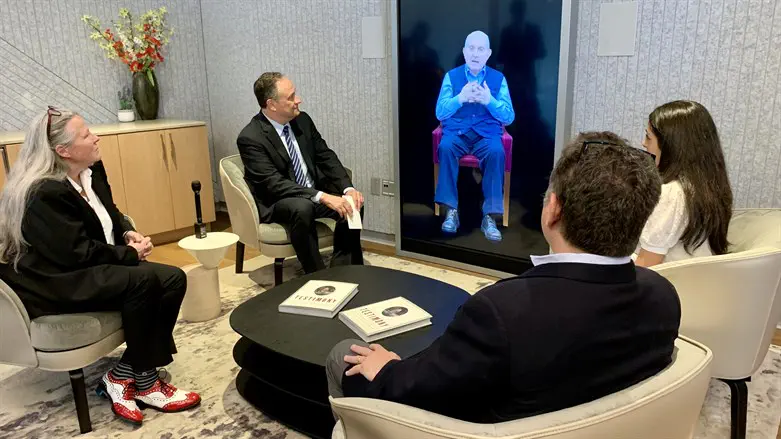
When Second Gentleman Douglas Emhoff sat down for a Zoom conversation with Holocaust survivor Pinchas Gutter on Wednesday, he opened by saying, “I feel like I already know you!”
Though the two had never met, Emhoff did, to an extent, know Gutter.
Just moments before the video call, Emhoff had engaged with Gutter’s interactive biography, asking him questions about his experience in concentration camps and even listening to Gutter sing “Shir Hama’alot,” the song that begins the blessing after meals.
Emhoff was at the University of Southern California’s Shoah Foundation, where he visited to explore the center’s Dimensions in Testimony project, a series of artificial intelligence bots that allow people to interact in real time with survivors of the Holocaust and other genocides.
As a USC alum and the first Jewish vice presidential spouse, Emhoff knew the experience would be special — overwhelming, even. But he said the exhibit “far exceeds what I thought it was going to be.”
“It’s so impressive, the use of the technology,” Emhoff told the Jewish Telegraphic Agency. “It’s so real. And you really felt you were in the room — you really felt you were talking to people. It was so engaging.”
The visit was the latest in a series of Jewish events Emhoff has hosted and attended in his official capacity as the Second Gentleman — and as a proud Jew.
“I never expected my Jewish faith to be that big a deal in this role,” he said. “As it turned out, I was very wrong. And I’m glad I was wrong, because it is a big deal.”
Emhoff has baked matzah with Jewish day school students, helped host the first online Passover seder at the White House, hung a mezuzah at the Vice President’s residence, and took part in festivities for Jewish American Heritage Month.
“You see these young kids screaming when I walked into the room like I was some kind of rock star,” Emhoff recalled with a laugh. “You really see that this representation matters. And knowing that, I take it very seriously. I know this means a lot to a lot of people, as it does to me.”
Emhoff’s presence also meant a lot to the staff at the Shoah Foundation.
“It was amazing,” Kori Street, the organization’s interim executive director, told JTA. “For me, for the staff, for the university, to have someone of his stature, who understands the importance of what we’re doing here, who has a connection to the archive, it was so meaningful just in terms of how insightful he was and how much he got it. That doesn’t always happen.”
Street kicked off Emhoff’s visit with an introduction to the center and its work. The institution is nearing its goal of reaching 10 million students globally each year, according to Street, and the AI initiative is a flagship product. The initiative, which the Shoah Foundation plans to make available through local Holocaust museums around the world, aims to ensure that the common practice of having survivors speak about their experiences can outlast the survivors themselves.
After showing Emhoff a video testimony of a Holocaust survivor from the same town as Emhoff’s family in Eastern Europe, it was time to meet Gutter.
Emhoff spoke first with the AI rendering of Gutter, asking him a series of questions about his survival story, his message to students today, and yes, asking Gutter to sing him a song.
“Thank you, Pinchas,” Emhoff said to the screen with a smile. “I’ll see you in the other room.”
There, real-life Gutter continued to share his story. He also expressed his gratitude to Emhoff and the Biden administration for their work combating hate and antisemitism.
“I really feel that you are able to make a difference, and you are making a difference,” Gutter told Emhoff.
Gutter spoke about the importance of sharing his story with younger generations — and of connecting his experience with current events. He mentioned Russia’s war on Ukraine multiple times.
“Take this flame,” Gutter said he tells students. “Light up the world with these flames and make the world a better place.”
Emhoff was visibly moved by Gutter’s story. Both Gutters, in fact.
“I love your message of unity,” Emhoff told the real-life Gutter over Zoom. “We all need to stand together and stand united against this epidemic of hate.”
As he thinks about the challenges facing the American Jewish community, Emhoff said the words of the AI Gutter expressed “exactly how I’m feeling about these issues.”
“That AI message really rang true,” Emhoff said. “Hearing his positivity after everything he’s been through — all these memories that he’s had to live with for so many years, 70-plus years — and to be so positive, and so upbeat, and be willing to share with the world now through this technology, his story, is just really, it’s amazing.”